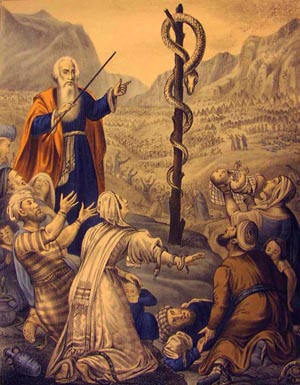Hi Bonjour / Hello [nickname_else_first_name],
Table of contents
1) Perashat Hashavoua - Rabbi Eli Mansour
2) Halakhat Hashavoua - Hazzan David Azerad
3) Holy Jokes!
1)PERASHAT HASHAVOUA
This Week's Parasha Insight with Rabbi Eli Mansour
Parashat Hukat: Avoiding Conflict – the Ultimate Good
The Haftara read on Shabbat Parashat Hukat is taken from the Book of Shoftim (11), and tells the story of Yiftah, the general who led a successful battle against the enemy nation of Amon, which had initiated hostilities against Beneh Yisrael.
Before going out to battle, Yiftah sent a message to the king of Amon, who had claimed that Beneh Yisrael was living in his territory. Yiftah explained the history of the region in question, which is told in Parashat Hukat. This region had been captured by Sihon, king of the Emori, from the nation of Moab, and later, when Beneh Yisrael requested the right to peacefully pass through this area to reach the Land of Israel, Sihon attacked them. Beneh Yisrael fought back and seized the territory. This is the connection between the story of Yiftah and Parashat Hukat.
The story of Yiftah begins by informing us that Yiftah was the child of an "Isha Zona," a term which has been interpreted in different ways. The Targum (Aramaic translation) translates this expression as "Pundekita," referring to a woman who runs an inn or a shop. The Radak (Rav David Kimhi, France, 1160-1235) explains that Yiftah’s mother was a "Pilegesh" (concubine), or secondary wife. Yet a third explanation is given by Rabbenu Bahya (Spain, 1255-1340), in Parashat Maseh. He writes that Yiftah’s mother had no brothers, and thus she inherited her father’s estate. She then married a man from a different tribe – which was against accepted protocol, as this resulted in her father’s tribe losing this property to her husband’s tribe. Women who violated this convention were derisively called "Isha Zona" (literally, "a harlot").
We then read that Yiftah’s brothers drove him away from the family, because they did not want him to receive a share in their father’s inheritance. They felt that he did not deserve a share because of who is mother was. According to all the interpretations mentioned earlier, this was wrong. As the Radak writes, Yiftah fully deserved an equal share of his father’s estate, and his brothers had no right to send him away and deny him a portion.
Remarkably, Yiftah responded by simply moving away. He did not file a complaint against his brothers in court, or wage any fight against them. Although his brothers acted wrongly, he moved away and avoided a Mahloket (fight). This is an inspiring example of the principle taught by Rav Haim Palachi (Turkey, 1788-1868) that one must flee from Mahloket like he would from a wildfire. Fighting is so destructive that it is worth sacrificing and foregoing even on that which one rightfully deserves to avoid it.
We are told that when Yiftah left his family, he settled in a place called "Eretz Tob" – literally, "the Land of Good" (11:3). One commentator explained the significance of this region’s name based on the story of creation (Bereshit 1). After each of the six days of creation, the Torah tells, "Va’yar Elokim Ki Tob" ("G-d saw it was good") – except after the second day of creation. The Rabbis explained that on the second day, G-d created the sky by separating between the upper waters and the lower waters, and thus, in effect, on this day, G-d created division. For this reason, He could not say about this day’s creation, "It was good." Divisiveness and conflict cannot be described as "good." Yiftah wisely avoided a full-blown conflict with his brothers, and so he is said to have resided in "Eretz Tob," the "Land of Good," because the ultimate good is avoiding fighting.
Often, people get into fights because they feel that they will gain from it, or that they will retrieve that which they rightfully deserve. But they fail to realize that the harm caused by fighting far outweighs any benefit that it could possibly yield. The greatest form of "goodness" which we can experience is peaceful relations with other people, and avoiding all strife and conflict.
2) HALAKHAT HASHAVOUA
Selected & translated by David Azerad, Hazzan Maghen Abraham
Halachot Seuda according to the rulings of Maran Rabbi Obadiah Yosef Z”TL
Important to wash your hands before eating?
Before eating bread, one is commanded to wash his hands with a vessel filled with water, and recite the Beracha
"ברוך אתה ה', אלוקינו מלך העולם, אשר קדשנו במצוותיו, וציונו על נטילת ידיים"
Then dry the hands properly.
What is the amount of bread one needs to eat in order to make Netilat Yadayim ?
It is not obligatory to make Netilat Yadayim , unless one eats at least 27 grams of bread ,anything above that one must make Netilat Yadayim .
Bevirkat Shabbat Shalom Umevorach
David Azerad
3) HOLY JoKeS!!
Selection of funny snippets, loosely related to this weeks parashah, to brighten your day







